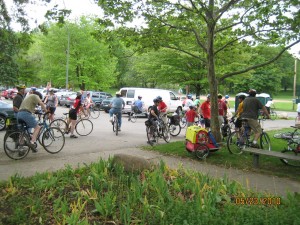Walking and cycling to UR may soon be made easier, in line with the vision to make Rochester more bikeable. A forum was held on Nov. 15 at the UR Medical Center to impart this vision to the public.
“We need to do some work to make the place more bicycle-friendly,” URMC CEO Bradford Berk said. “Changing avenues for getting here will be important.”
The Rochester Cycling Alliance (RCA) is working with the UR Center for Community Health to understand the obstacles of cycling to and from the campus, as well as to come up with potential improvements.
Among the biggest concerns mentioned at the forum were safety and cold weather.
Scott McRae, UR professor of Ophthalmology, feels that there are plenty of roads in Rochester where pedestrians and cyclists don’t have much choice.
“Cycling down Elmwood Avenue is not very safe,” Berk said.
It also poses a danger to pedestrians when cyclists use the sidewalk to get to campus.
Addressing the cold weather issue, McRae uses cities like Minneapolis, Minn. and Madison, Wis. as model cold-weather cities that have embraced the active transportation lifestyle.
“Both cities are preferentially plowing strategically selected bike lanes,” McRae said. “Improvements in clothing, gear and lights have improved safety and ability to ride even under harsh conditions and at night.”
Some other factors to consider were bike parking options, multi-modal transportation and shower and locker facilities.
Glenn Cerosaletti, director of UR Center for Community Leadership, points out that not all buses at UR have bike racks on the front.
The number of cyclists at UR has increased threefold in the last four years. This was in part due to the free bicycle-lending project called “City Cycles,” started by UR students in 2004. Studies show that City Cycles’ bikes are used mostly for general recreation and off-campus errands.
“We’ve got a lot of students involved in working with us to figure out where to place and store the bicycles for the winter season,” Richard Pifer, UR vice president of facilities and services, said.
Many interested parties at URMC are figuring out ways to improve access to the Medical Center through cycling and busing. More secured storage spaces for bikes are currently being built, applying the same security system currently used to secure the doors.
Pifer also points out that the UR Campus Master Plan, approved in October 2009, complements the goals of RCA. Ongoing efforts under the plan include improving gateways and reinforcing the University’s edges to make them compatible with the local neighborhood.
Erik Frisch, a city of Rochester transportation specialist, shared the Rochester Bicycle Master Plan at the forum. Expected to be finalized by January 2011, the project assesses desirable zoning changes and implements them through regularly scheduled street projects.
“We are committed to bringing that plan to reality,” Frisch said.
These goals were contextualized, however, by the potential difficulties in finding funding for them.
“I know how much it costs to remove snow in Rochester,” Pifer said. “We have to understand that the University has a finite amount of resources and a lot of people competing for it.”
The forum also provided an overview of the health and economic benefits of active transportation.
“[It is a] huge dividend in terms of health if we can reduce chronic diseases and problems associated with motor vehicle accidents,” McRae said.
Emphasis was placed on the household savings that result from a reduction in driving.
“The average American family spends 19 percent on transportation more than how much we spend on health care,” McRae said.
Cerosaletti also shared his personal experience of 10 years of cycling to the campus.
“My bicycle commute can be a meditative experience, even when I’m riding in traffic, because it requires me to focus my attention closely on my position relative to other vehicles and to communicate and cooperate with drivers to ensure that we both get where we need to go,” Cerosaletti said.
Both members of RCA, MacRae and Cerosaletti are working to make Rochester as bikeable as the top bike-friendly cities in America, such as Portland, Or.
The forum also provided opportunities for community members to share their ideas for solving this problem. One of the most prominent suggestions was to improve the occasional parking permit, which allows individuals to park for free if they only drive to work a limited number of times each month.
Community members, University leadership and RCA members all agree, however, that advertising about the benefits of cycling and the Master Bicycle Plan are critical to their success.
Lim is a member of the class of 2014.


